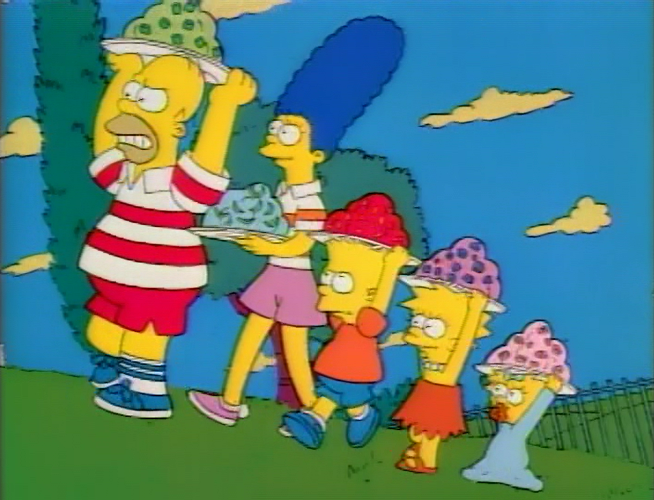 If the Simpsons ever do any right, it’s a miracle, and the picnic at Mr. Bruns’s mansion is a typical disaster. Thinking that the boss likes dessert, Homer, Marge, Bart, and Lisa bring gelatin dessert to the picnic. (So does everyone else.) It’s an...
If the Simpsons ever do any right, it’s a miracle, and the picnic at Mr. Bruns’s mansion is a typical disaster. Thinking that the boss likes dessert, Homer, Marge, Bart, and Lisa bring gelatin dessert to the picnic. (So does everyone else.) It’s an...
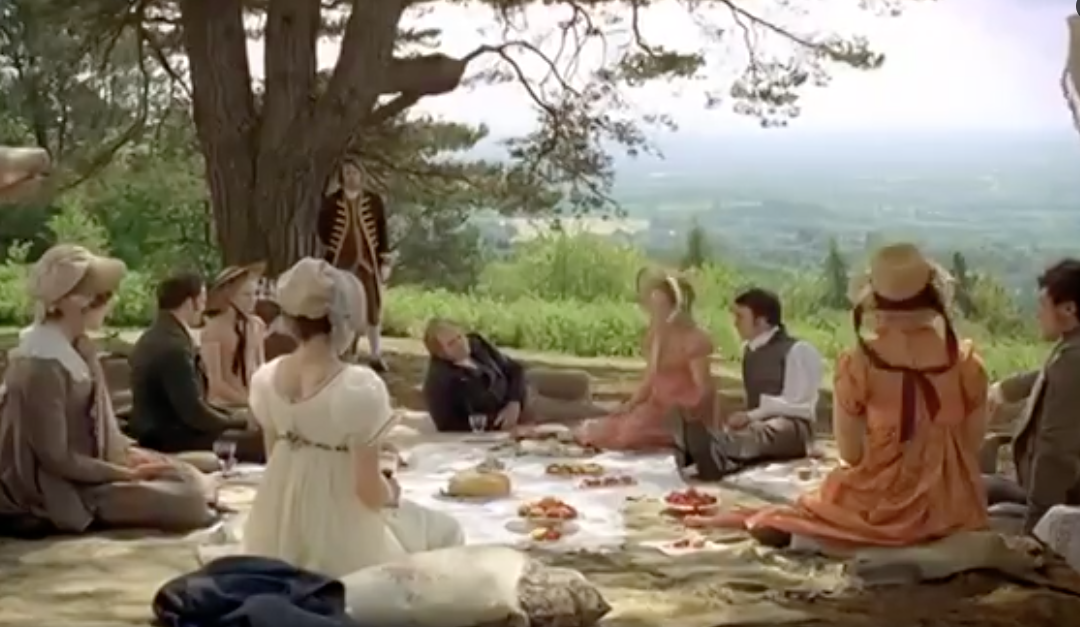 O’Hanlon supposes Box Hill picnic must be a combination of informality and gentility. Servants carry amenities for a regiment so that Emma, Knightley, et al. sits on a sparkling white cloth (with cushions, of course) drinking wine in crystal goblets, served by...
O’Hanlon supposes Box Hill picnic must be a combination of informality and gentility. Servants carry amenities for a regiment so that Emma, Knightley, et al. sits on a sparkling white cloth (with cushions, of course) drinking wine in crystal goblets, served by...
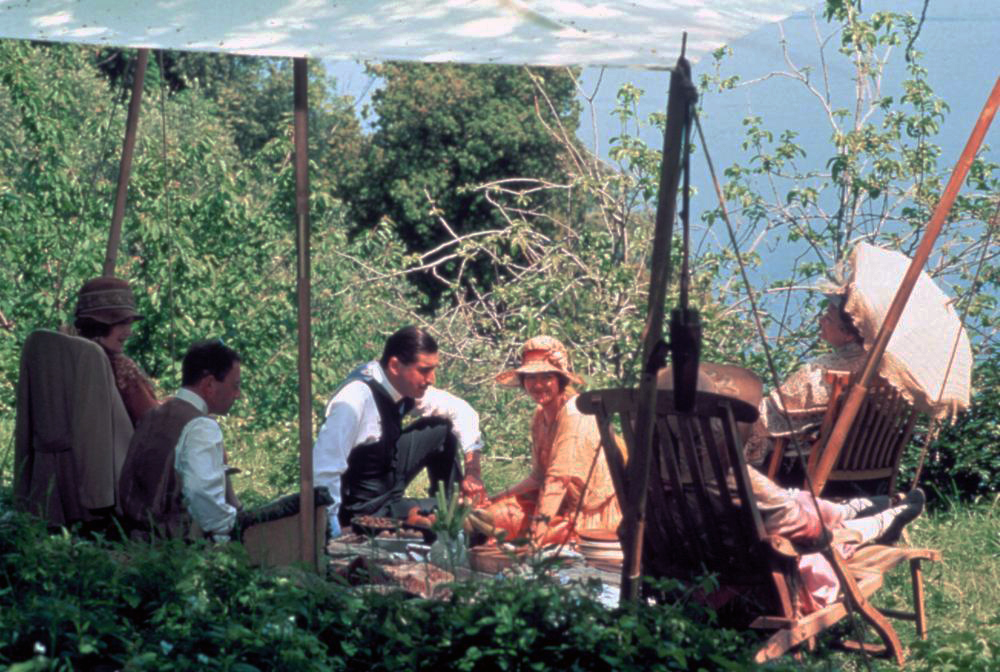 The picnic at the Castello San Salvatore in Portofino’s vicinity is a happy fairy tale. * Saint Salvatore suggests salvation for the four women, all suffering from emotional depression and finding friendship and renewal of love. Mike Newell’s Enchanted...
The picnic at the Castello San Salvatore in Portofino’s vicinity is a happy fairy tale. * Saint Salvatore suggests salvation for the four women, all suffering from emotional depression and finding friendship and renewal of love. Mike Newell’s Enchanted...
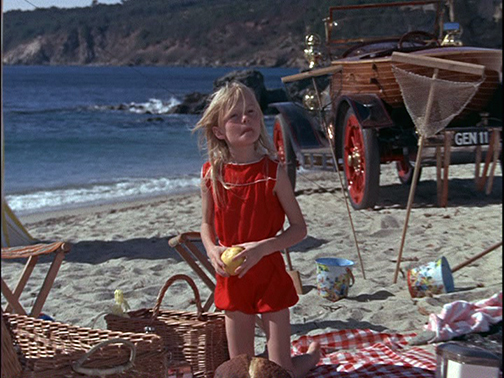 Hughes’ Chitty Chitty Bang Bang is a romantic musical comedy so loosely based on the novel that Fleming would have difficulty recognizing it. Of course, Chitty Chitty Bang Bang, the magical automobile, is present. Commander Potts and his children Jemima...
Hughes’ Chitty Chitty Bang Bang is a romantic musical comedy so loosely based on the novel that Fleming would have difficulty recognizing it. Of course, Chitty Chitty Bang Bang, the magical automobile, is present. Commander Potts and his children Jemima...
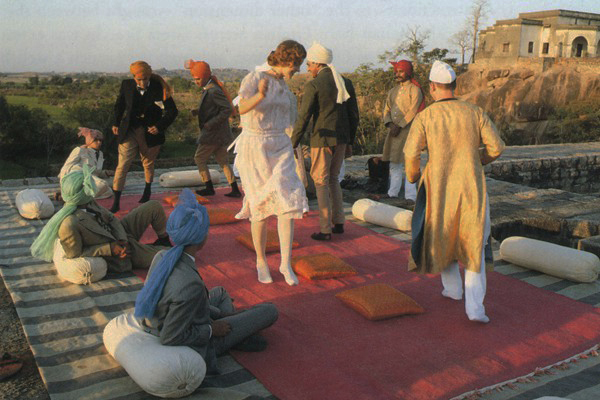 Ruth Prawer Jhabvala’s Heat and Dust has two picnics. But as the screenwriter for James Ivory’s film, she included only Olivia Rivers, a British colonial wife, picnic with the Nawab, the local ruler of a small state in central India. Bored with her husband, Rivers...
Ruth Prawer Jhabvala’s Heat and Dust has two picnics. But as the screenwriter for James Ivory’s film, she included only Olivia Rivers, a British colonial wife, picnic with the Nawab, the local ruler of a small state in central India. Bored with her husband, Rivers...
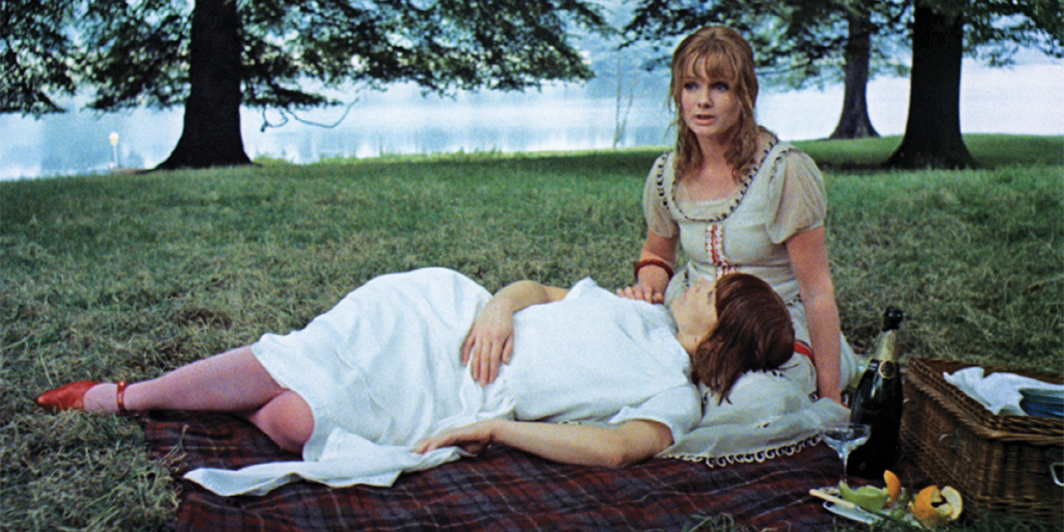 As in Lawrence’s Women in Love, Russell’s water party, a euphemism for a picnic, begins happily in the bright light of the early afternoon but ends dismally in the evening, partially illuminated by gaudy party lights. More like a country fair than an...
As in Lawrence’s Women in Love, Russell’s water party, a euphemism for a picnic, begins happily in the bright light of the early afternoon but ends dismally in the evening, partially illuminated by gaudy party lights. More like a country fair than an...
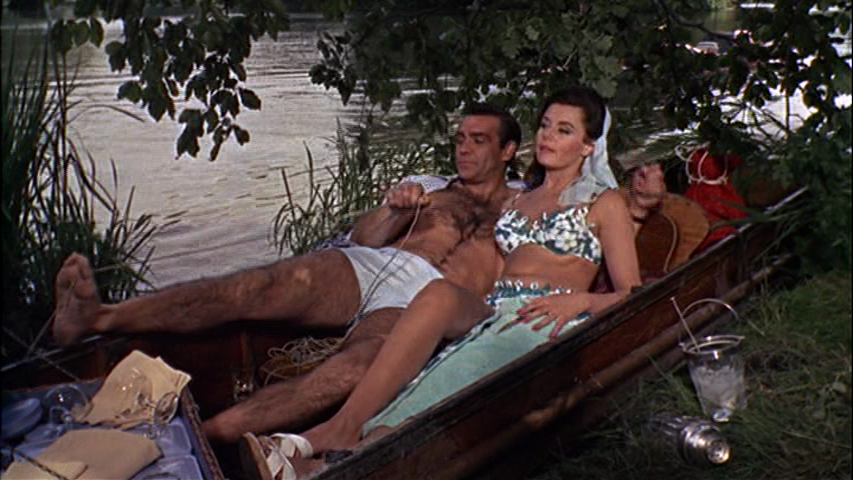 Young’s picnic Russia With Love is not in Ian Fleming’s novel. Young’s picnic begins when Bond and his current lover Sylvia Trench are punting in a boat on /River Cherwell in Oxford. It’s summer. They are tied up in the shade, dressed in bathing suits, and comfortably...
Young’s picnic Russia With Love is not in Ian Fleming’s novel. Young’s picnic begins when Bond and his current lover Sylvia Trench are punting in a boat on /River Cherwell in Oxford. It’s summer. They are tied up in the shade, dressed in bathing suits, and comfortably...
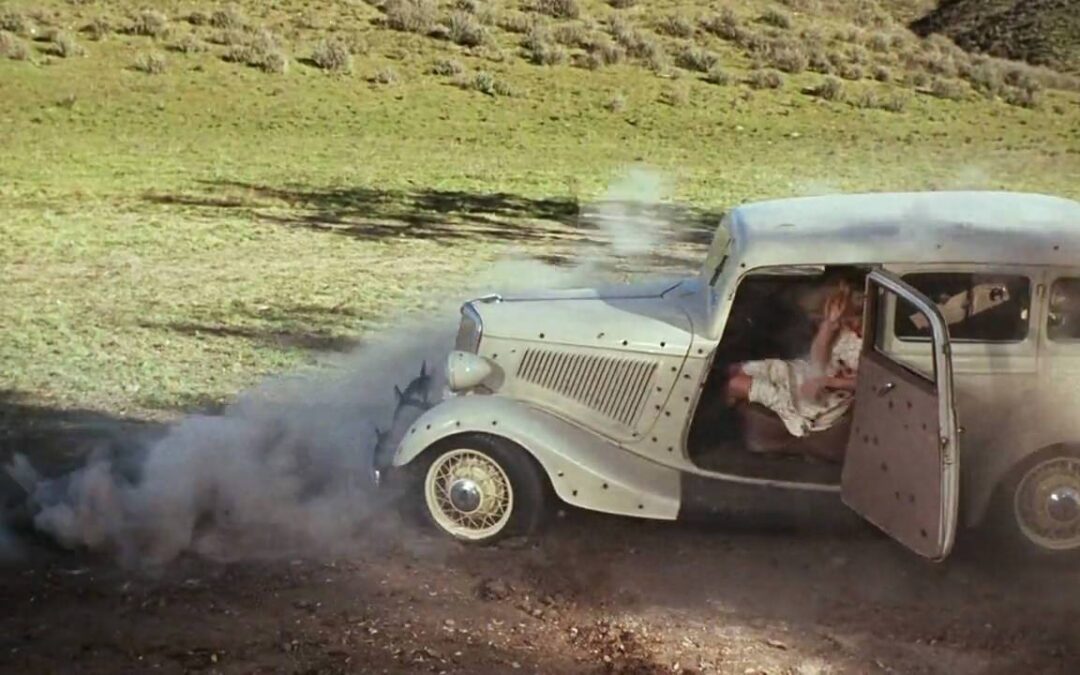 If you do not know the picnickers are Bonnie Parker and Clyde Barrow, bank robbers and murderers, Penn’s picnics seem ordinary. Penn figured that picnics make good human interest episodes and would humanize Bonnie and Clyde’s selfishness and essential...
If you do not know the picnickers are Bonnie Parker and Clyde Barrow, bank robbers and murderers, Penn’s picnics seem ordinary. Penn figured that picnics make good human interest episodes and would humanize Bonnie and Clyde’s selfishness and essential...
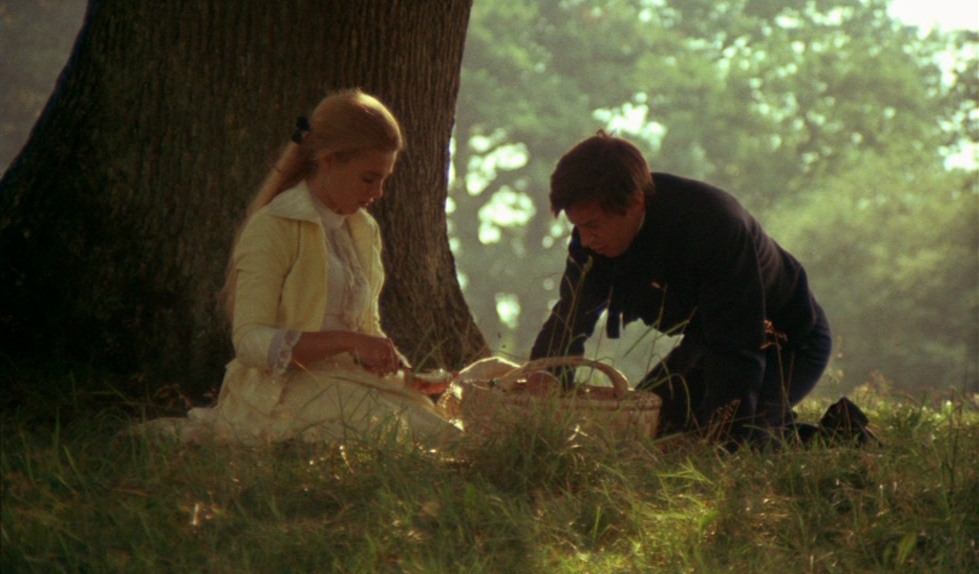 Widerberg’s Elvira Madigan has two picnics. The first is a lover’s idyll; the second is sad and deadly. When Elvira Madigan, aka Hedvig Jensen, a circus performer, and Count Sixten Sparre, a married cavalry officer, eloped, their life together was a picnic. Their...
Widerberg’s Elvira Madigan has two picnics. The first is a lover’s idyll; the second is sad and deadly. When Elvira Madigan, aka Hedvig Jensen, a circus performer, and Count Sixten Sparre, a married cavalry officer, eloped, their life together was a picnic. Their...
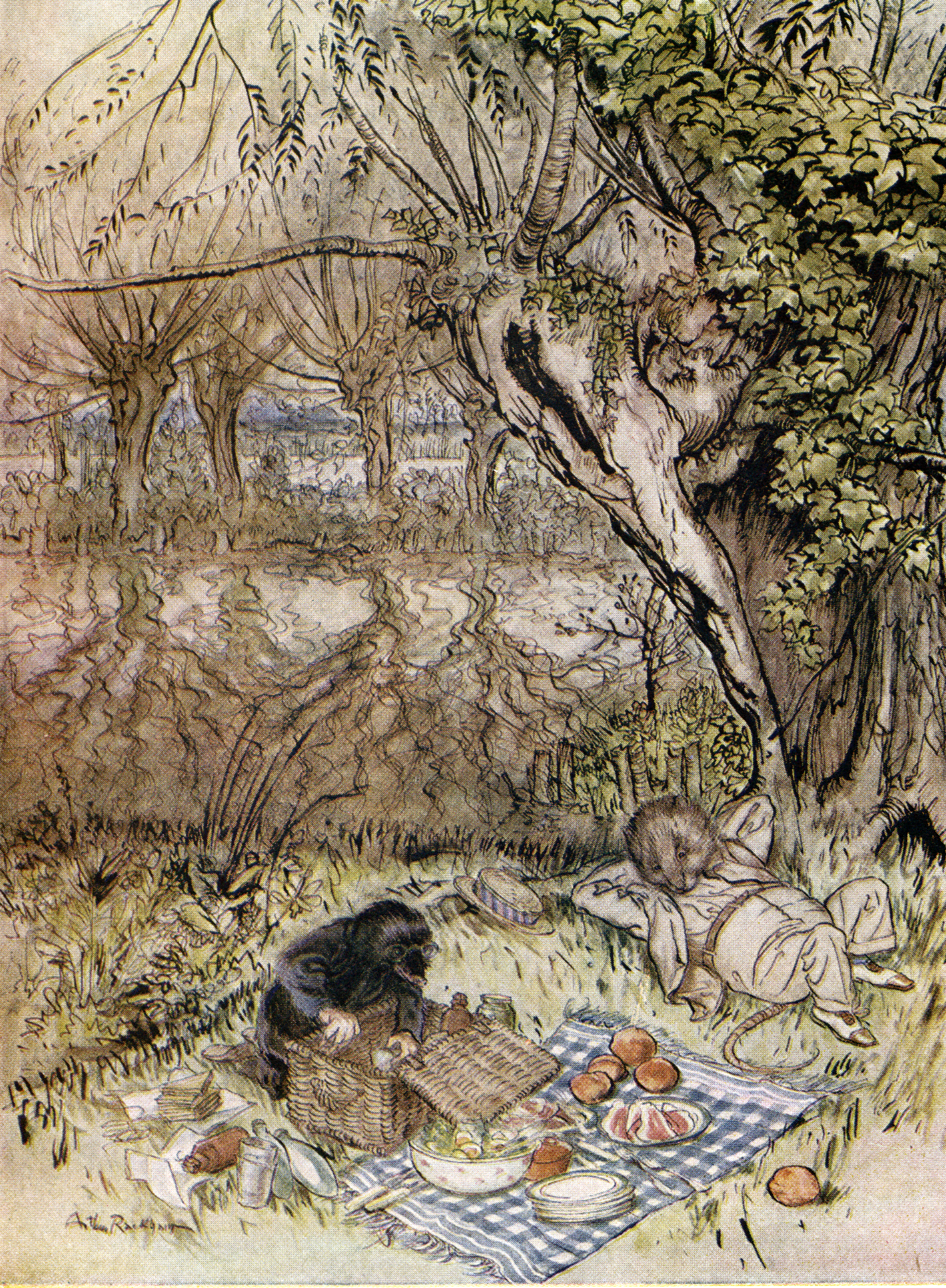 “The Mole begged as a favour to be allowed to unpack it all by himself,” In Wind in the Willows by Kenneth Grahame. New York: Scribner’s Sons, 1931.
“The Mole begged as a favour to be allowed to unpack it all by himself,” In Wind in the Willows by Kenneth Grahame. New York: Scribner’s Sons, 1931.
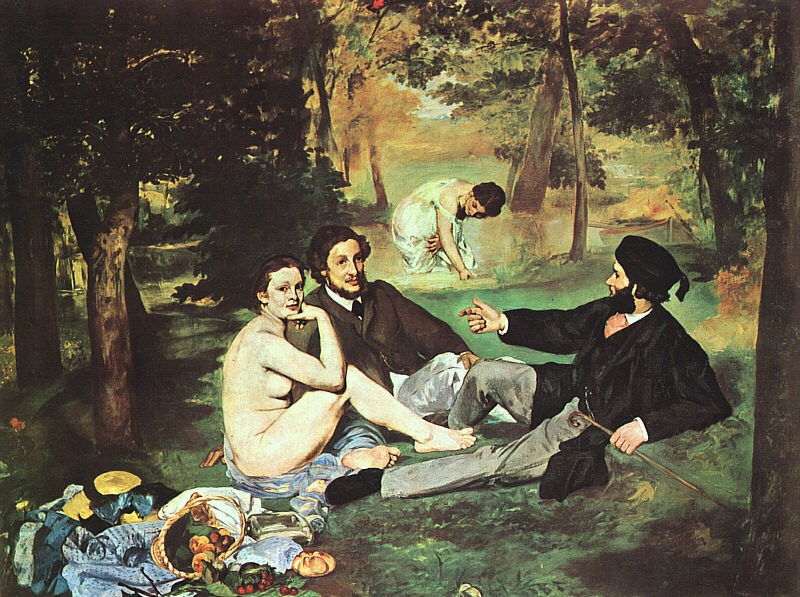 Manet’s Le déjeuner sur l’herbe is a French euphemism for picnic in English. Pique-nique was not used for an alfresco luncheon but for dinner indoors, repas de pique-nique. When it was exhibited in 1863 at the Salon des Refusés, the painting was titled Le...
Manet’s Le déjeuner sur l’herbe is a French euphemism for picnic in English. Pique-nique was not used for an alfresco luncheon but for dinner indoors, repas de pique-nique. When it was exhibited in 1863 at the Salon des Refusés, the painting was titled Le...
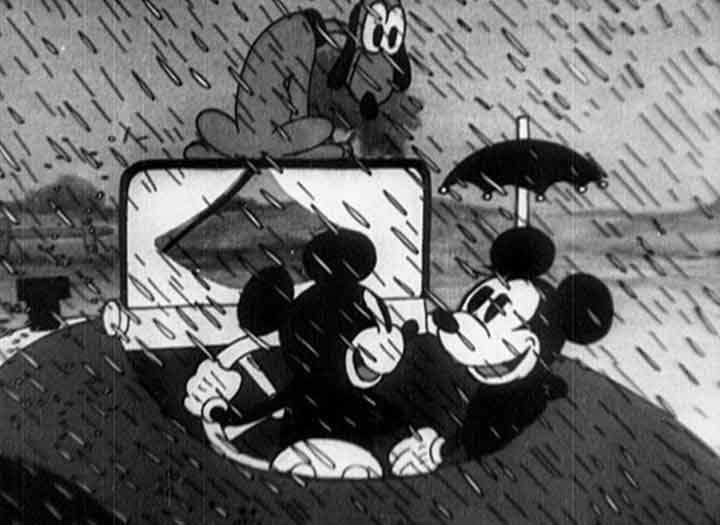 Disney’s seven-minute cartoon The Picnic packs as many picnic conventions as possible: a motorcar drive to the country, a stream, shady tree, a wicker basket, a gingham cloth jammed with a gourmand feast of sandwiches, Swiss cheese, mustard, pickles, olives, honey,...
Disney’s seven-minute cartoon The Picnic packs as many picnic conventions as possible: a motorcar drive to the country, a stream, shady tree, a wicker basket, a gingham cloth jammed with a gourmand feast of sandwiches, Swiss cheese, mustard, pickles, olives, honey,...
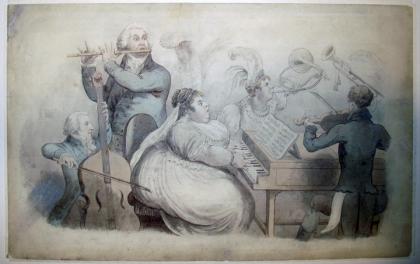 The Pic-Nic Society was a London club devoted to theatrical entertainment, lavish dinners, and gambling. The Pic-Nics notoriety invited scandal and satire. Burney’s The Pic-Nic Orchestra is a knock-off of James Gillray’s The Pic-Nic Orchestra. Caricatures...
The Pic-Nic Society was a London club devoted to theatrical entertainment, lavish dinners, and gambling. The Pic-Nics notoriety invited scandal and satire. Burney’s The Pic-Nic Orchestra is a knock-off of James Gillray’s The Pic-Nic Orchestra. Caricatures...
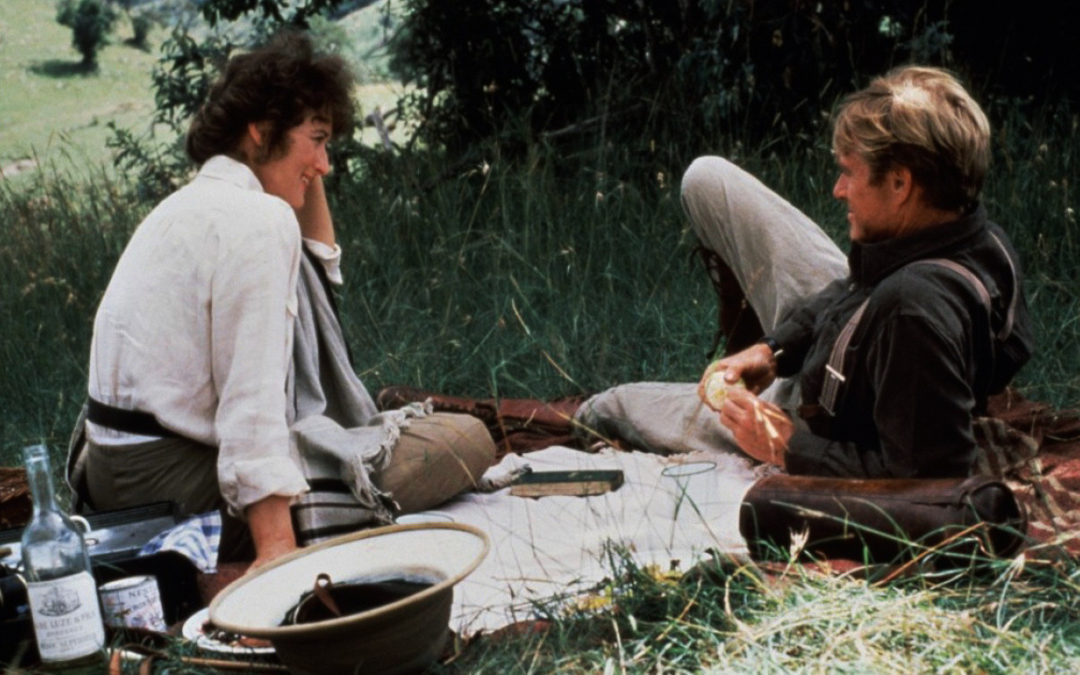 Blixen’s Out of Africa is a memoir without picnics. But Pollack and his screenwriter Kurt Luedke have added two picnic episodes that reveal Blixen’s characteristic vanity and romantic nature. Neither is a particularly happy picnic. The first picnic is in...
Blixen’s Out of Africa is a memoir without picnics. But Pollack and his screenwriter Kurt Luedke have added two picnic episodes that reveal Blixen’s characteristic vanity and romantic nature. Neither is a particularly happy picnic. The first picnic is in...
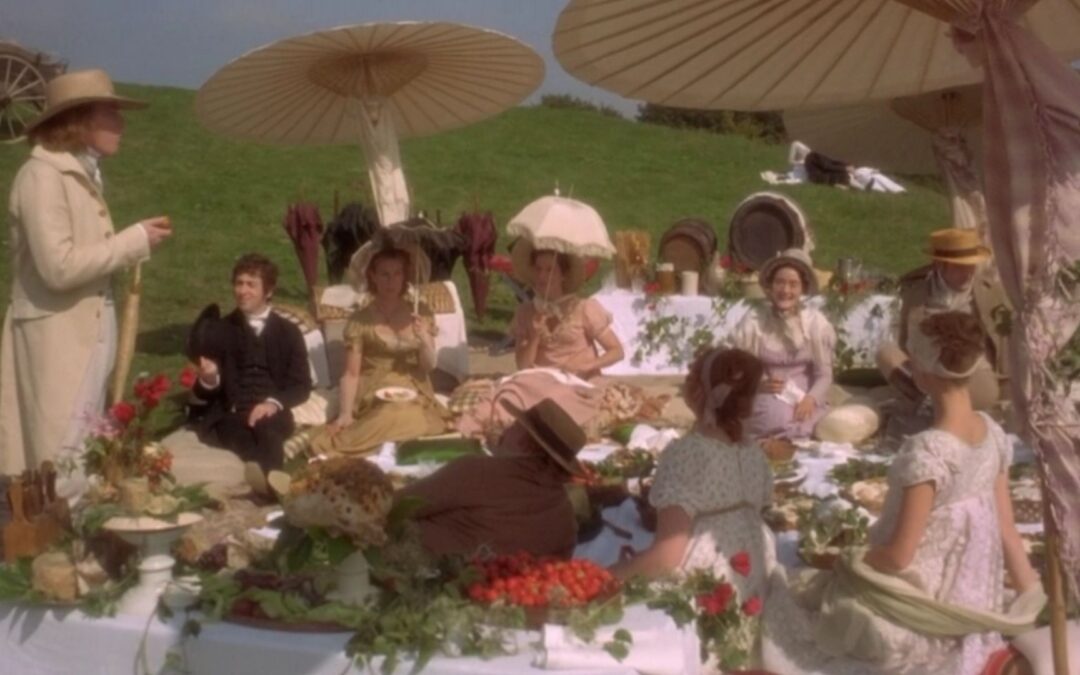 By the last count, seven directors have filmed Austen’s Emma. None of them are definitive or even alike. A list is provided as a separate entry. McGrath’s Emma is lively, and his picnic episode at Donwell Abbey and Box Hill is reasonably close to...
By the last count, seven directors have filmed Austen’s Emma. None of them are definitive or even alike. A list is provided as a separate entry. McGrath’s Emma is lively, and his picnic episode at Donwell Abbey and Box Hill is reasonably close to...
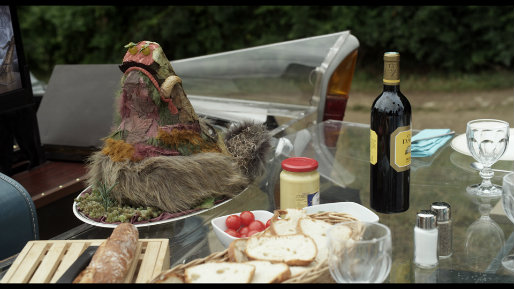 The picnic in Gondry’s Mood Indigo [L’Écume des jours] is his invention, a goofy addition to Boris Vian’s surrealistic novel L’Écume des jours. * It’s the love story of Colin, who is manic and unpredictable, and Chloe, who is stable until she meets...
The picnic in Gondry’s Mood Indigo [L’Écume des jours] is his invention, a goofy addition to Boris Vian’s surrealistic novel L’Écume des jours. * It’s the love story of Colin, who is manic and unpredictable, and Chloe, who is stable until she meets...
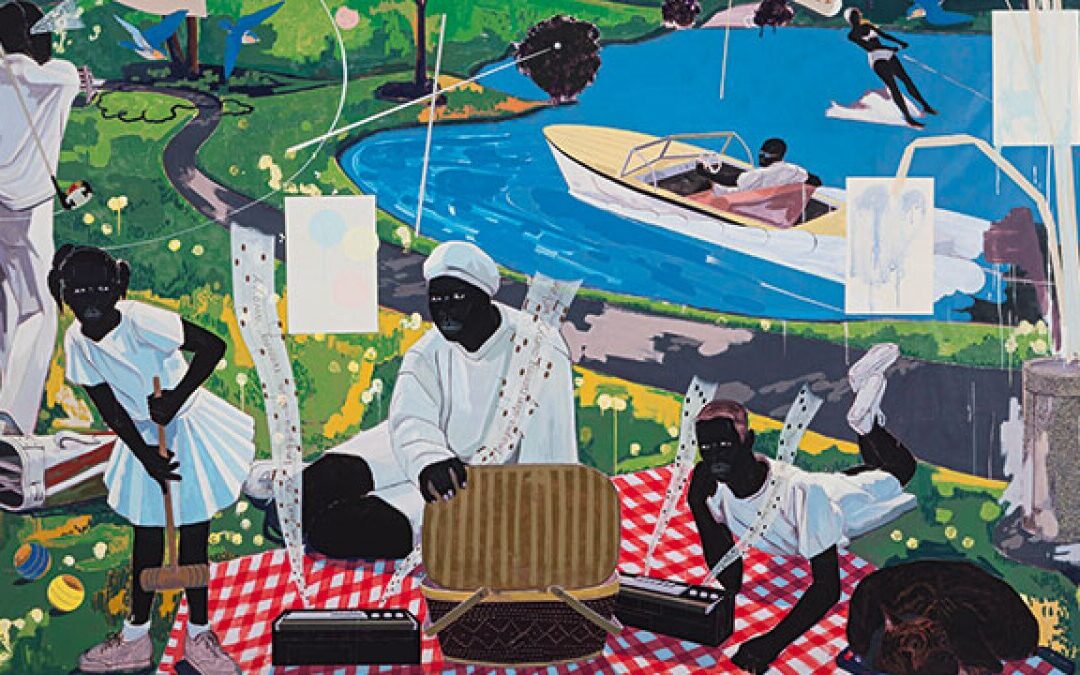 Marshall’s title of Past Times is ambiguous. Usually, leisure activities are “pastimes,” but as two words “past times” suggests his memories of picnics or, more generally, the pleasantries of leisure. His ambiguity is intentional, especially because this is a picnic...
Marshall’s title of Past Times is ambiguous. Usually, leisure activities are “pastimes,” but as two words “past times” suggests his memories of picnics or, more generally, the pleasantries of leisure. His ambiguity is intentional, especially because this is a picnic...
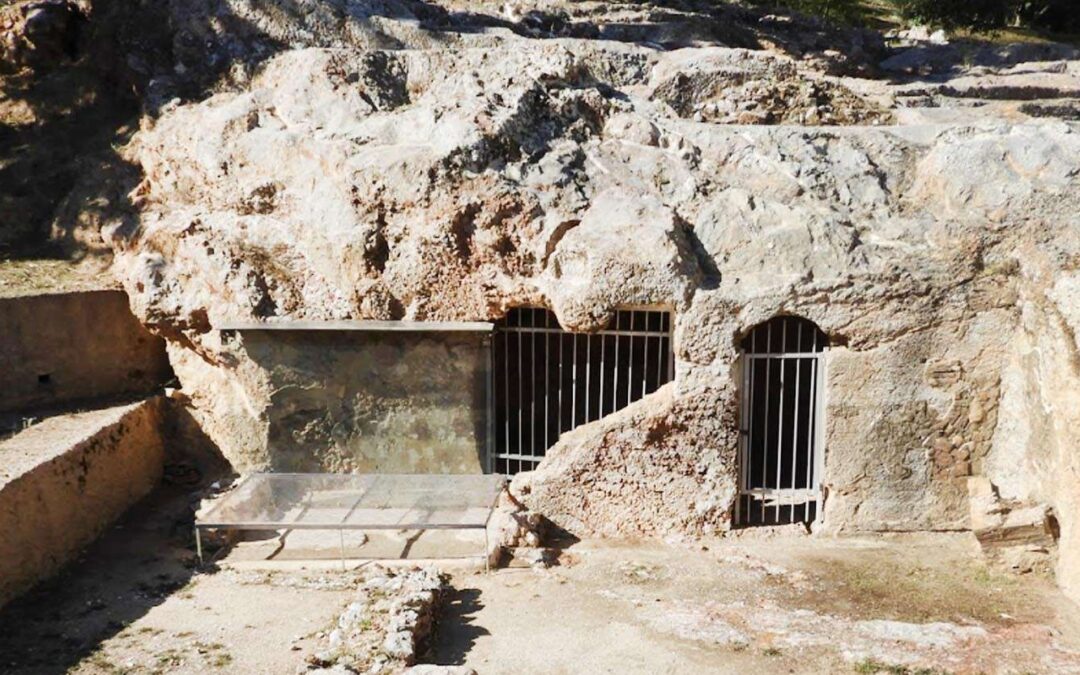 Menander’s comedy The Bad-Tempered Man [aka Dyskolos] was lost for centuries until discovered in the 1950s. A pivotal episode is a pilgrimage to the shrine of Pan at Phyle on a hillside in what is now Athens, where a sacrificial meal will cooked to appease the...
Menander’s comedy The Bad-Tempered Man [aka Dyskolos] was lost for centuries until discovered in the 1950s. A pivotal episode is a pilgrimage to the shrine of Pan at Phyle on a hillside in what is now Athens, where a sacrificial meal will cooked to appease the...
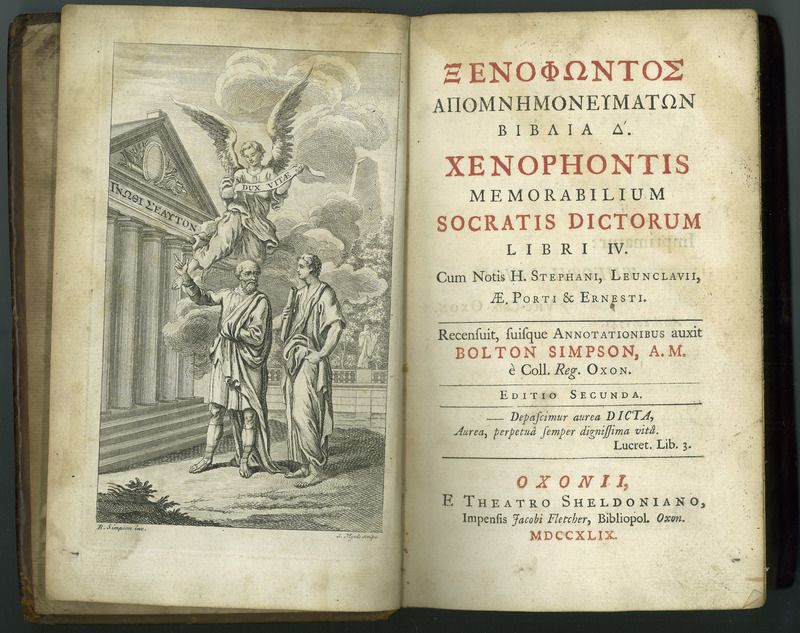 The custom of sharing food or eranos was common among the ancient Greeks. In The Memorabilia, Xenophon discusses a dinner party at which Socrates suggests that the food and drink be collected in common stock, so there is no social discord about who brought what to...
The custom of sharing food or eranos was common among the ancient Greeks. In The Memorabilia, Xenophon discusses a dinner party at which Socrates suggests that the food and drink be collected in common stock, so there is no social discord about who brought what to...
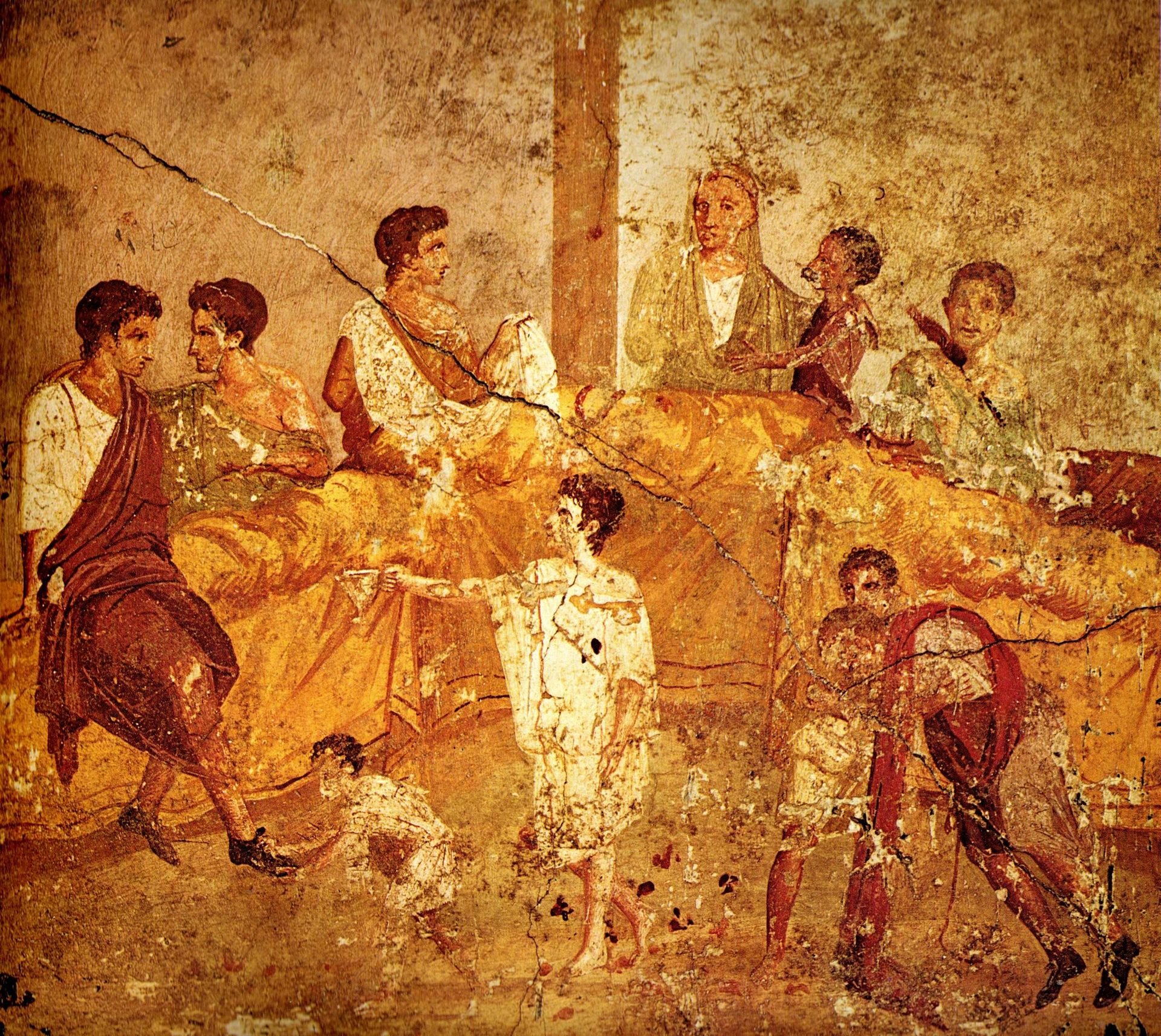 Horace delights in a rustic country dinner resembling eranos, the Greek custom of dining where each guest contributes something. A guest might contribute money, food, drink, or entertainment. Horace’s adaptation of this custom required that his guest provide...
Horace delights in a rustic country dinner resembling eranos, the Greek custom of dining where each guest contributes something. A guest might contribute money, food, drink, or entertainment. Horace’s adaptation of this custom required that his guest provide...





















